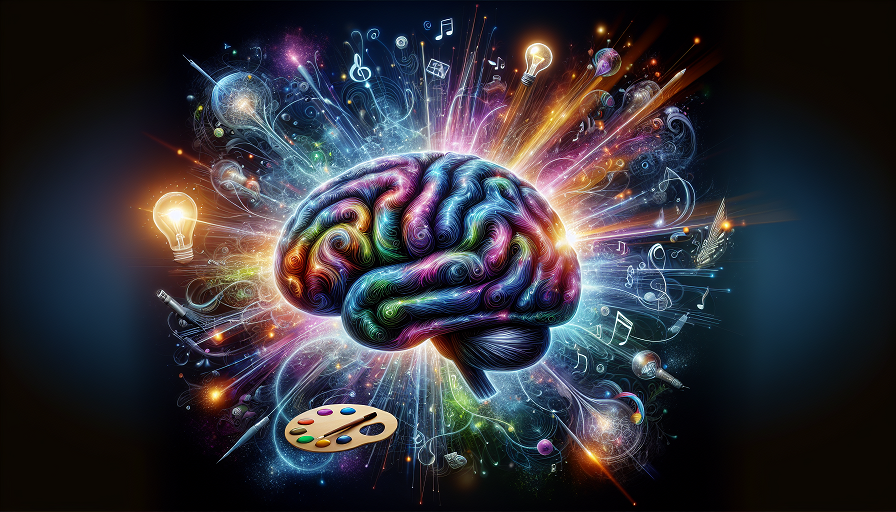
Our brains are remarkable, constantly buzzing with ideas and thoughts. However, there’s a hidden force that can throw a wrench in the workings of our mental machinery: fatigue. You might have noticed that after a long day, your creative juices aren’t flowing as freely as they do when you’re well-rested. Why does this happen? Here we look at the intricate link between mental energy and creativity, and how certain brain-boosting supplements might play a role in keeping your creative spark alive.
Contents
The Connection Between Mental Energy and Creativity
Mental energy is the fuel that powers our thought processes, from solving math problems to crafting creative stories. Imagine trying to drive a car without gas; it simply won’t take you anywhere. Similarly, without sufficient mental energy, your brain struggles to come up with original ideas and solutions. Creativity isn’t just about being artsy; it’s the ability to see things from a new perspective, solve problems, and think outside the box.
When your brain is brimming with energy, you can make novel connections between seemingly unrelated concepts—a key aspect of creativity. However, this kind of thinking requires a lot of mental resources. Just like a high-performance sports car, your brain operates best when it’s well-fueled and maintained. Tired and depleted, it can’t function at its peak, and creative thinking can come to a halt.
How Fatigue Affects Creativity
Fatigue comes in many forms, whether from lack of sleep, prolonged stress, or intense concentration over a period of time. When you’re fatigued, your brain’s neural networks don’t communicate as effectively. This disruption makes it harder to integrate ideas from different parts of the brain, which is critical for creativity.
Additionally, fatigue can cause your brain to become more rigid, clinging to familiar patterns and repeating what you already know rather than venturing into new territory. This is because creativity often involves a degree of uncertainty and the ability to take risks—which, when tired, your brain is less willing to do. It’s not surprising, then, that a good night’s sleep often leads to a fresh perspective and renewed creativity.
Nootropics: Boosting Brain Power
While rest and relaxation are the best remedies for mental fatigue, some people turn to nootropics to give their creativity a boost. Nootropics are substances designed to enhance brain function, often referred to as “smart drugs” or brain supplements. They range from naturally occurring substances like caffeine and omega-3 fatty acids to synthesized compounds such as racetams.
These supplements claim to improve various aspects of brain function, including memory, focus, and yes—creativity. For instance, some nootropics are thought to increase blood flow to the brain, improve the uptake of important nutrients, and facilitate the creation of new neural pathways. Although research is ongoing, many users report feeling more focused and mentally energized after taking nootropics, which could help bypass the creative blocks caused by fatigue.
Finding the Right Balance
While nootropics might provide a short-term boost in mental energy, it’s crucial to use them responsibly. Depending too much on supplements can lead to over-reliance, and not all nootropics have a proven track record for safety and efficacy. Therefore, it’s essential to consider them as a part of a broader approach to brain health.
Aside from supplements, other lifestyle factors play significant roles in maintaining mental energy. Regular physical activity, a balanced diet rich in brain-boosting nutrients like antioxidants and essential fatty acids, adequate sleep, and stress management techniques are all vital for nurturing creativity and keeping your mind sharp.
Simple Tips for Enhancing Your Creativity
- Practice mindfulness: Techniques such as meditation can help improve focus and reduce stress.
- Stay curious: Learning new skills or exploring different interests can stimulate creative thinking.
- Engage in brain teasers: Puzzles, crosswords, and other mental games help keep your mind agile.
- Take breaks: Allow your mind to reset and refresh—stepping away from a problem, even briefly, can often provide new insights.
- Surround yourself with creativity: Whether it’s art, music, or literature, exposing yourself to creativity can inspire your own innovative thinking.
The Role of Technology in Creative Expression
Technology has become an indispensable tool in enhancing our creative expressions. Digital platforms and tools provide spaces for artists, writers, and innovators to not only create but also to collaborate and share their work with a global audience. However, the omnipresence of technology can be a double-edged sword, offering both endless possibilities and potential over-stimulation.
Digital tools can aid creativity by simplifying processes, such as video editing software, graphic design applications, or music production tools. These resources lower the barrier to entry for many creative pursuits, allowing more people to explore their interests. Moreover, online courses and tutorials provide access to learning and inspiration, making skill-building more accessible than ever.
On the flip side, the constant notifications and information overload from smartphones and computers can sap mental energy and creativity. Setting boundaries around technology use and creating dedicated times for disconnecting can help maintain focus and mental clarity.
Creativity and Mental Energy
Understanding the connection between mental energy and creativity can help you take proactive steps to maintain your creative edge. Fatigue is an inevitable part of life, but by prioritizing your mental health, integrating beneficial habits, and considering safe options like nootropics under guidance, you can effectively manage your energy levels and inspire original thinking.
In the journey to harness your full creative potential, small, sustainable changes can make a significant difference. It’s about striking the right balance between activity and rest, stimulation and relaxation. Whether through improving lifestyle habits or exploring the cautious use of brain supplements, the path to enhanced creativity starts with caring for your mind and its need for energy.

